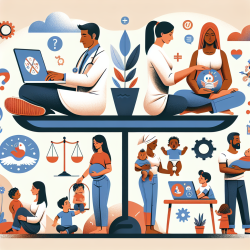Understanding the Impact of Sensitive Questions in Surveys
The addition of a citizenship question to the 2020 census has been a topic of extensive research and debate. The study titled "Predicting the Effect of Adding a Citizenship Question to the 2020 Census" offers valuable insights into how sensitive questions can impact survey response rates, particularly among noncitizen populations. As practitioners in the field of special education and online therapy, understanding these dynamics can enhance our skills in data collection and interpretation.
Key Findings from the Research
The study found that the inclusion of a citizenship question could lead to a significant drop in self-response rates, particularly in households that may contain noncitizens. This is due to the sensitivity surrounding citizenship status, which can cause respondents to skip questions or provide inaccurate answers. The research predicts an overall 2.2 percentage point drop in self-response rates, which could increase costs and reduce the quality of census data.
Implications for Practitioners
For practitioners, the findings highlight the importance of understanding the sensitivity of certain questions and the potential impact on data quality. Here are some strategies to consider:
- Be Mindful of Question Sensitivity: When designing surveys or assessments, consider the potential sensitivity of questions and how they might affect response rates.
- Ensure Confidentiality: Clearly communicate the confidentiality of responses to build trust and encourage honest participation.
- Use Alternative Data Sources: Consider supplementing survey data with administrative records to improve data accuracy.
- Encourage Self-Response: Implement strategies to encourage self-response, such as simplifying questions and providing multiple response options.
Encouraging Further Research
While the study provides valuable insights, it also opens the door for further research. Practitioners are encouraged to explore additional factors that may influence response rates and data quality, such as cultural differences and language barriers. By continuing to investigate these areas, we can develop more effective strategies for data collection and interpretation.
To read the original research paper, please follow this link: Predicting the Effect of Adding a Citizenship Question to the 2020 Census.










